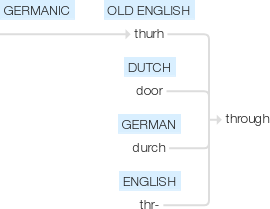Through
Old English thurh (preposition and adverb), of Germanic origin; related to Dutch door and German durch . The spelling change to thr- appears c. 1300, becoming standard from Caxton onwards.
wiktionary
From Middle English thrugh, thruch, thruh, metathetic variants of thurgh, thurh, from Old English þorh, þurh, þerh, þærh(“through, for, during, by, by means of, by use of, because of, in consequence of”), from Proto-Germanic *þurhw(“through”), from Proto-Indo-European *tr̥h₂kʷe, suffixed zero-grade from *terh₂-(“to pass through”) + *-kʷe(“and”). Cognate with Scots throch(“through”), West Frisian troch(“through”), Dutch door(“through”), German durch(“through”), Gothic 𐌸𐌰𐌹𐍂𐌷( þairh, “through”), Latin trans(“across, over, through”), Albanian tërthor(“through, around”), Welsh tra(“through”). See also thorough.
From Middle English thrugh, þrouȝ, throgh, from Old English þrūh(“trough, conduit, pipe; box, chest; coffin, tomb”), from Proto-Germanic *þrūhs(“excavated trunk, trough”), from Proto-Indo-European *terh₃u-(“to rub, turn, drill, bore”).
etymonline
through (prep., adv.)
late 14c., metathesis of Old English þurh, from Proto-Germanic *thurx (source also of Old Saxon thuru, Old Frisian thruch, Middle Dutch dore, Dutch door, Old High German thuruh, German durch, Gothic þairh "through"), from PIE root *tere- (2) "to cross over, pass through, overcome." Not clearly differentiated from thorough until early Modern English. Spelling thro was common 15c.-18c. Reformed spelling thru (1839) is mainly American English.
